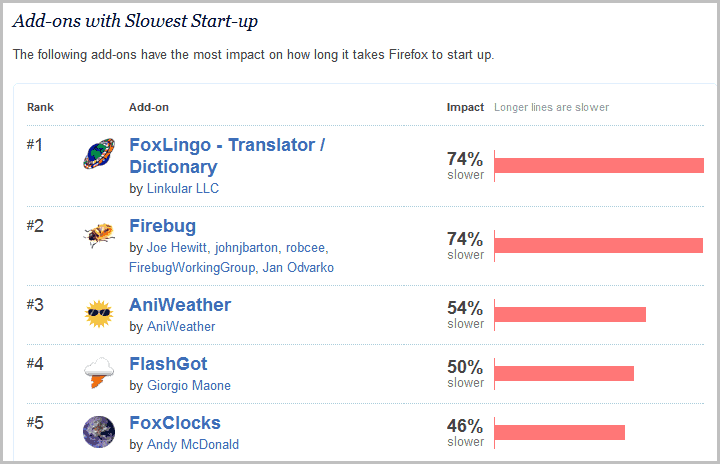Mozilla: Each Firefox Add-on Adds 10% To Firefox Startup On Average

Add-ons can severely impact the startup time of the Firefox web browser: On average "each add-on you install adds about 10% to Firefox start-up time" notes Mozilla's Justin Scott in a post on the Mozilla Add-Ons Blog.
This means that the startup time of Firefox on average doubles if ten add-ons are installed.
Mozilla has made the decision to improve overall add-on performance, and the blog post lists plans of the Mozilla development team to improve the performance of add-ons in the Internet browser.
Probably the most interesting point on that list is that Mozilla intends to prevent automatic installations of add-ons without the user's permissions.
It is quite common that programs (security software for instance) install toolbars and other browser add-ons without the user's consent. Even worse, these add-ons are often the cause of performance problems and problematic to remove.
In an upcoming version of Firefox, third party add-ons will not be installed unless the user explicitly allows the installation in Firefox
Another improvement for Firefox end users are slow performance warnings that will be added to the Firefox add-on gallery for add-ons that slow down the Firefox start-up time by more than 25%.
Automated performance testing and on demand performance testing will be run regularly on the backend. Results are accessible for everyone on the newly created Performance listing that lists the top 50 offenders.
Two of the add-ons, Firebug and FoxLingo, slow down the start of the browser by 74%, followed by AniWeather with 54%, Flashgot with 50% and Floxclocks with 46%.
The first add-on that I'm using, Video DownloadHelper is placed 7 with 33%.
The page lists the top 50 add-ons that increase the startup time of the browser. Only two add-ons that I use are in the list, but they increase the startup time by 49%.
Mozilla asks add-on developers to optimize their add-ons so that they have less than 5% impact on the startup time of the web browser.
Firefox users can disable add-ons that they do not use regularly. Disabled add-ons are not loaded during Firefox startup. My guess is that we will see features similar to those that Microsoft has added to Windows over time, namely on-demand activation of add-ons (possible thanks to the new restartless design) and delayed add-on start-ups.
Another alternative for Firefox users is to work with multiple profiles to reduce the performance impact and startup time. Say you use Firefox for web development and normal web surfing. You could create one profile for web development, with add-ons like Firebug, and one profile for normal surfing without those web development related extensions.
Still, the best news for the end user is the end of automatic add-on installations without user permission. It is not clear if that will also block plugins from being automatically active in the web browser, lets hope it does.





















I am not sure how much add-on’s contribute to startup time. When I added the Bartab add-on, my startup times got much better, despite having 70 add-on’s and 21 plugin’s installed.
FF developers seem a bit lost these days, unable or unwilling to address real issues (so they waste their time with stupid ideas like removing the status bar in 4.x).
They need to hold some public focus groups and get views from the non-developer community.
Maybe then they would focus on needed and important work like add-on memory management, which I think a lot of leaks occur. Or displaying how much memory add-on’s are using in real -time?
And how about browser close time? It sometimes take s up to TWO minutes for the browser task to end for me. I sit there watch memory be freed little by little (the browser memory total declines little by little until the task finally disappears form the task list).
wasn’t there an article on here about tweaking firefox, I believe there was a tweak which resulted in faster start up times be extracting language files from extensions, wouldn’t it be better if mozilla address this from multiple perspectives and do something about this as well, I have no idea on whats the best way to achieve this but I’m sure both parties (extension developers and mozilla developers) they can come up with something.
Sloe start-up is one thing and something
I am willing to live with for key add-ons.
Slowing of browsing performance itself is another matter
and there appears to be no reliable measure of that.
Great news indeed that ending of auto update of the add-on.
After your article i took a look a the start up list and main first slower starting up add on is standing on number 12. And your article about the start up time did me take a good hart look to all main installed add- on, and so I removed 8 add-on. Say a sort of spring cleaning.
Hopefully the next step will be that when a add-on is not necessary anymore, there will be a advice to uninstall the not necessary any more add-on.
Apart from the performance issues, it is also important to highlight from this intended change some security enhancements as well.
By preventing the installation of add-ons that some software automatically initiates when Firefox is run, and if such an extension is not explicitly installed by the user, then the user has the power now to prevent execution of such add-ons.
This behavior is usually criticized as an attack vector to the browser, and I also agree if plugins can be controlled the same way. This is a very much welcome news indeed, and I can’t wait to see it implemented.
/m